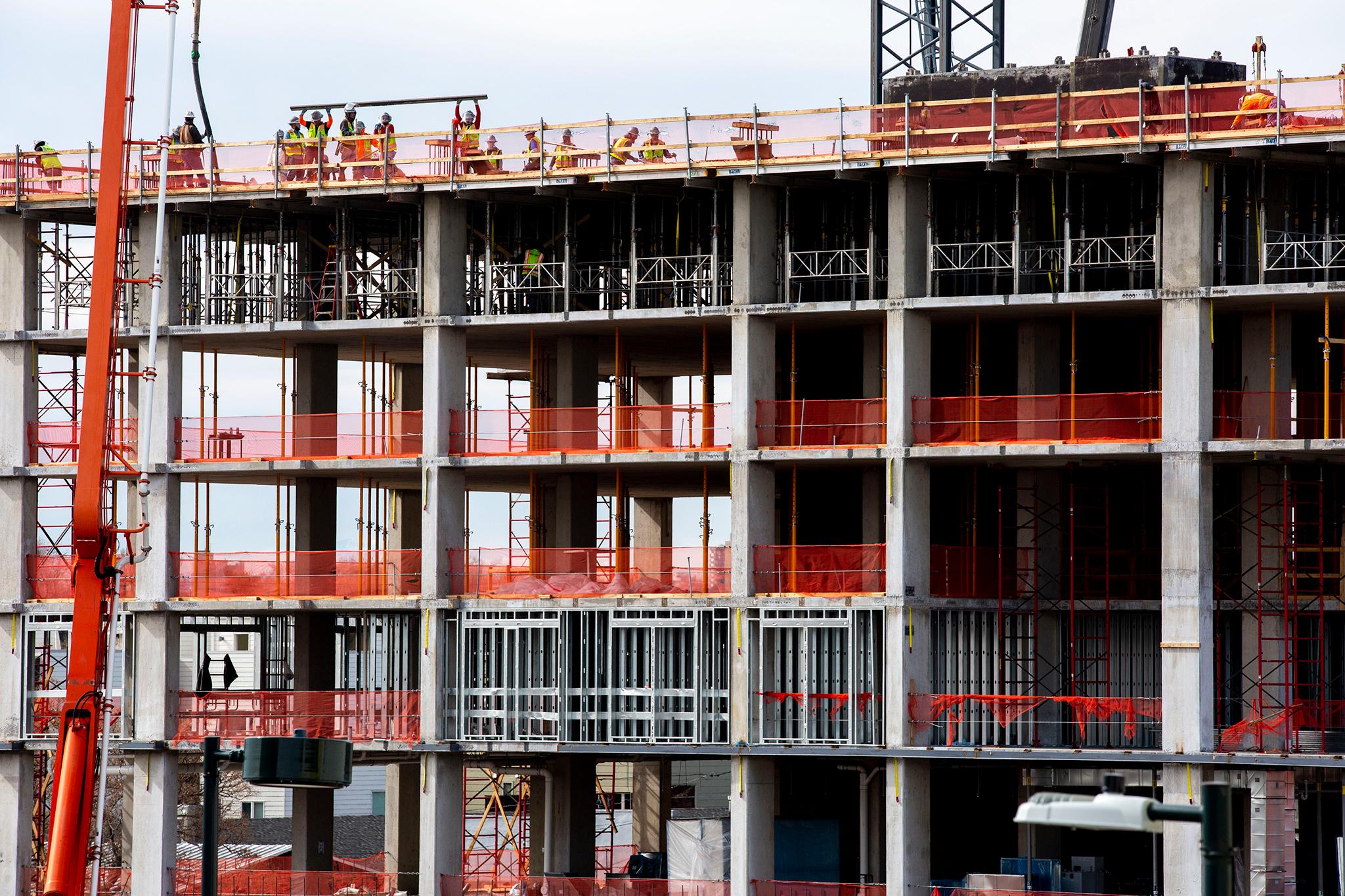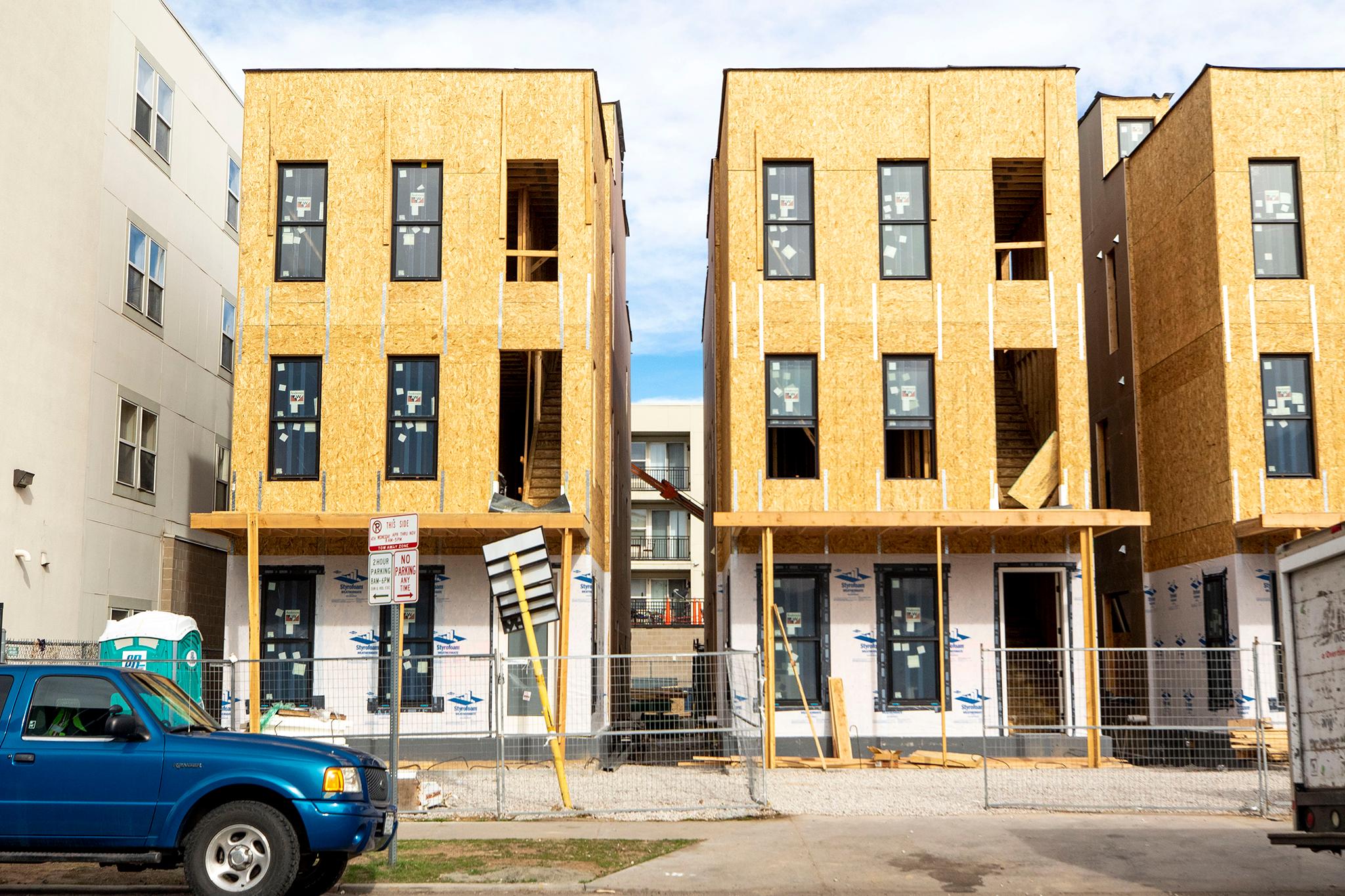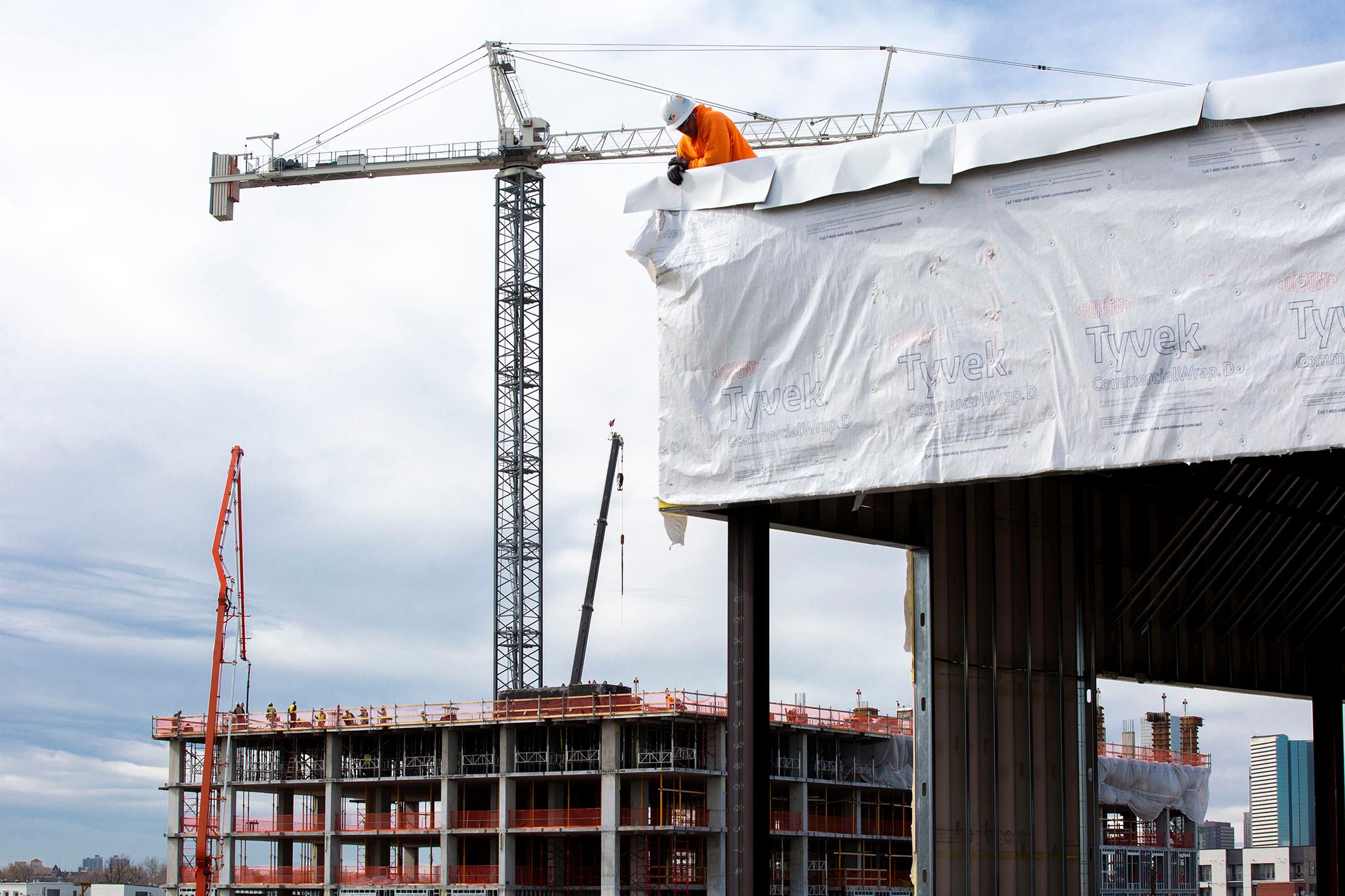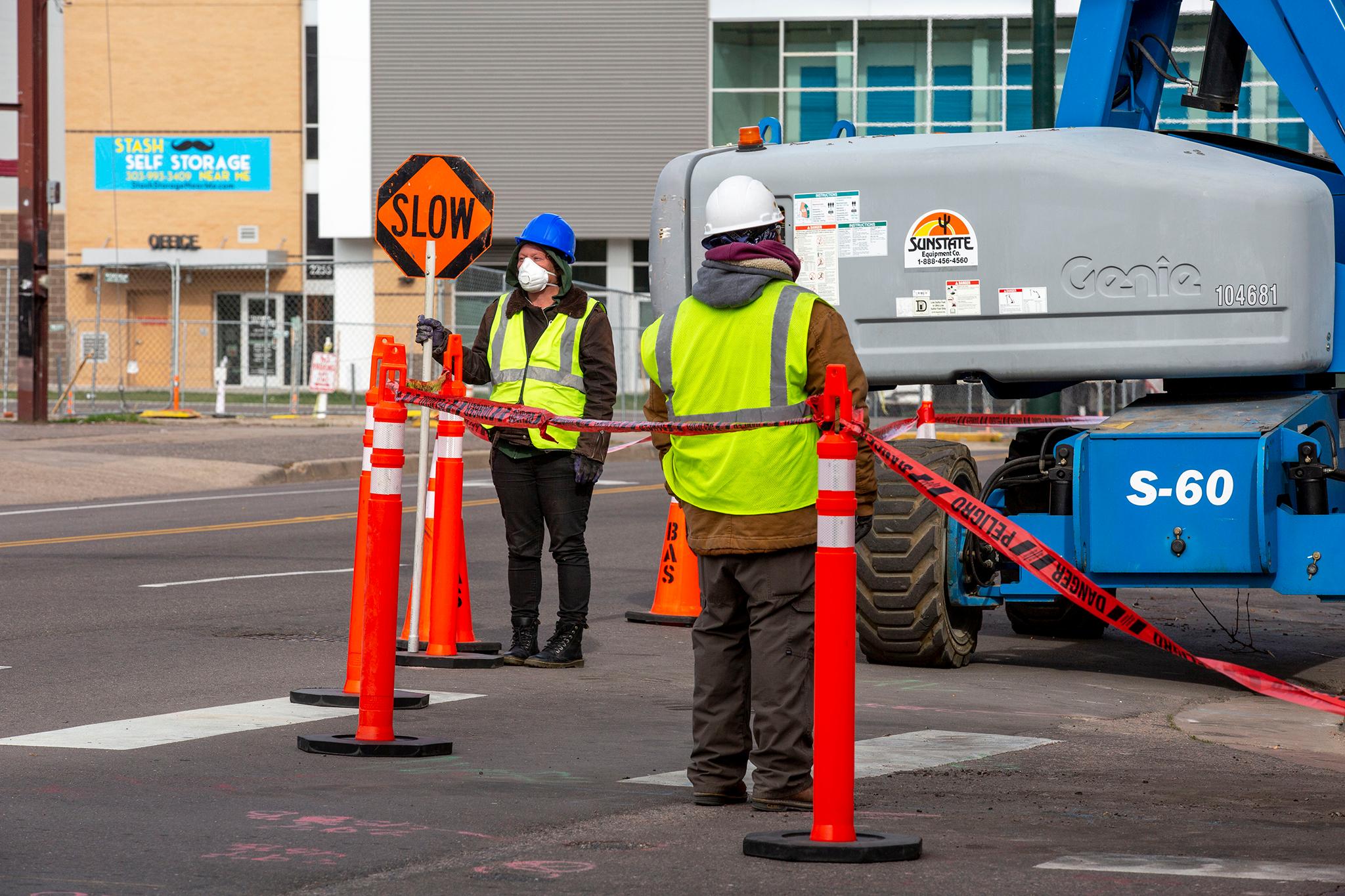When Denver Mayor Michael Hancock and Colorado Governor Jared Polis knighted construction an essential industry late last month, they may have kept a sputtering economy going. They also may have exposed construction workers and their families to more health risks than their peers in industries where working from home is more doable.
Now it's up to individual companies and their foremen and forewomen to make sure workers aren't spreading the disease on sites throughout the city. That means working six feet apart, washing hands, and wearing gloves and masks in some cases, according to state rules. It means not sharing tools. It means allowing only one trade -- carpenters, drywallers, sheet metal workers -- in a building at a time.
Kirk Jordan, vice president with Denver's operating engineers union, was running out the door last Thursday to get tested for COVID-19, the deadly respiratory disease caused by a new coronavirus strain.
"People that have potentially been exposed are being sent home for two weeks and then being tested," Jordan said. "We're just trying to play it safe as best (we can), really, and enforce the social distancing."
Jordan has spent some time on the site of the I-70 widening, a project being managed by Kiewit, a local construction giant. He said the company is doing a good enough job keeping workers apart despite his pending viral test, but that "mom and pop" shops might have a tougher time.

Pat Hammil, CEO of Oakwood Homes, a large general contractor, said he and others in the industry are trying to make sites safe, but it's a tall order.
"Is it happening 100 percent of the time?" Hammil said. "No."
Industry boosters, including Mayor Hancock, say construction keeps a lot of people employed and a lot of people making money to buy things they need, which keeps a lot of people employed and a lot of people making money to buy things they need, which keeps a lot of people employed and...
Construction is a crucial part of Denver's economy. New rooftops don't just mean more places to live, work and shop. They mean more jobs, furniture sales, appliance sales, tool sales, lumber sales. Construction is a force multiplier.
"They are critical to the economic ecosystem," Hancock said in an interview. "It's one of the few industries that actually touch just about every stream in the economy. And so to shut them down would have been even additionally devastating to the economy.
"The economy is an under-girding element to it all. But it's not like we look at it and say, 'Will the economy collapse if we don't get out of the way?' That's not the way we look at it. It's what helps us to keep people healthy and safe first, and then what are those operations that do that?"
Tom Goulet was skeptical of Hancock's initial orders as well as the governor's orders, which Denver eventually adopted. Goulet owns Woodcraft Unlimited, an architectural millwork and cabinetry company that has 27 employees and works with 20 subcontractors. Woodcraft was doing work for two big general contractors, which Goulet did not want to name, that he says told his employees to get back to work. Goulet had pulled them off of what he considered a nonessential job -- cosmetic improvements to a lobby in a downtown office building.

"I have with my people just implored them to consider each of their situations personally, and if they feel as if they're in danger, whether it be in our manufacturing facility or out on the job, they can leave," Goulet said last week.
Gov. Polis's guidelines on construction have since changed. They originally allowed a construction free-for-all. No projects were off-limits. Now the state government is asking companies nicely to stop some projects -- to "encourage deferral of nonessential work" like home renovations. But Polis did not draw a hard line in the sand.
Hancock said he put the public's health and safety before the health of the economy when he made the decision to exempt construction workers from his stay-at-home orders. He cited people's need for housing, including affordable housing (which is being built at a much slower rate than market-rate homes).
But just because workers on bustling project sites are supposed to work six feet apart doesn't mean they will. And if they don't, it's not necessarily enforceable.
Hammil of Oakwood Homes said he visited one of his sites last week and "wasn't happy with what I saw."
A team of 24 city government inspectors enforce the statewide stay-at-home order. The team would theoretically cite businesses violating physical distancing rules. As of Friday afternoon, they had made nearly 5,000 contacts and given 964 warnings since March 26, according to data from Denver's COVID-19 joint information center.
Inspectors have cited businesses 13 times since March 26. None of them were construction companies.
"Obviously we look for voluntary compliance," Hancock said. "The goal is to inform them initially and educate them and discourage the violation of those distancing requirements. And then we move to the next level."
Citations lead to a court date where a judge can fine companies up to $999 and issue jail time.

Hammill and his company, which builds whole neighborhoods in Stapleton and Green Valley Ranch, is trying to drill the new guidelines into their workers and subcontractors. They have a strategy meeting every morning at 9 a.m. He's ordered signs to instruct people how to work safely.
Oakwood also added overtime opportunities and about 20 days of paid time off, the CEO said, giving workers more flexibility to stay home or make more money if they feel well.
"We just emphasize if somebody's sick of feeling stuck or doesn't feel well, go home," Hammil said. "If everyone gets sick, there is no industry."
The COVID-19 pandemic will last much longer than 20 days, according to the state health department. It has yet to peak in Colorado.
Keeping the construction industry churning has sparked a local debate that mirrors a national one: Should preserving the economy come at the cost of health risks? Does it have to? And who are the people taking the risk?
Denver-area construction workers make $17.78 an hour on average, according to the job-finding website Indeed, which takes an average of over 400 salaries. The U.S. Bureau of Labor Statistics put the average hourly figure at $25 in 2018, but pay for executives and workers in the oil and gas industry inflate that amount.
The local construction industry is mostly Latino, said Chris Martinez, head of the Hispanic Contractors of Colorado. Martinez doesn't see race or class playing a role in the decision to make construction essential.
"(COVID-19) does not discriminate," Martinez said. "And there are several different types of industries -- some industries where I believe Latinos do not make up enough of the workforce -- that are still out there having to work as essential employees."
Hancock and Polis also made liquor stores, marijuana dispensaries, bike shops, auto garages and news media organizations essential, among many other industries.
But Ean Tafoya, co-chair of the Colorado Latino Forum, sees a blatant omission of equity.
"Latinos definitely make up more of the workforce, hence more of them are being put at risk," Tafoya said of construction workers. "If you couple that with the fact that Latinos tend to live in places where they're exposed to more general air pollution in the first place, they're more susceptible.
Mayor Hancock said many construction laborers want to work and be paid, which informed his decision to make construction an essential industry.
"What we learned is that most people would prefer to continue working in the industry and obviously they would prefer not to get sick as well," Hancock said, citing the physical distancing orders that accompanied his edict.
The ability to stay home if a worker doesn't feel comfortable being on-site changes company to company, said Jordan of the operating engineer's union. But federal tax credits available to employers through the Family First Coronavirus Response Act should help. The FFCRA Act helps businesses with 500 employees or less and gives employees the right, in some situations, to have between two and 10 weeks of sick leave.
Tafoya wants to see the government help pay tenants' rents and mortgages to release economic pressures on workers. Without the help, he says some people are faced with an untenable choice: working to feed their families or risking their health.
This article was updated to correct the title of Ean Tafoya, which is co-chair of the Colorado Latino Forum, not treasurer.













